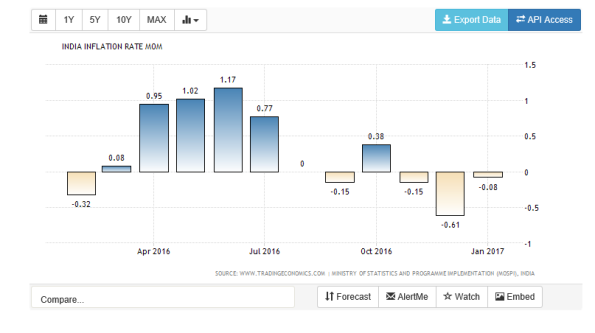“Our major competitor is cash. Cash is what we seek to eliminate” Recently, the Indian government overnight abolished most cash. With dire consequences. What are the economic consequences, why did the Indian government do this? Economies like those of India have, for a bunch of reasons, often relatively high rates of inflation. After the abolishing of cash, India suddenly experienced ‘ugly’ deflation (‘ugly’ i.e. provoked by a fall in demand as well as contributing to this fall in demand) Norbert Häring convincingly argues that the Indian government was pushed by ‘fintech’ and the USA government, with Bill Gates playing an especially important role. And we haven’t seen the end of this. No quotes, soon a separate blogpost. Zerohedge shows some of the micro consequences. Money is a ‘social contrivance’, as shown by this quote: “It was a booming sunrise industry before November 8th. Not now,” said Vipin Malhan, president of the Noida Entrepreneurs Association, who also runs a business that makes cellphone accessories here. “Many small factories and assembling units, which used to work round-the-clock, with three shifts, have scaled down to just a single shift. We are all in shock now. One word that businesses dread is ‘uncertainty.’ The government has thrown that at us.
Topics:
Merijn T. Knibbe considers the following as important: Uncategorized
This could be interesting, too:
tom writes The Ukraine war and Europe’s deepening march of folly
Stavros Mavroudeas writes CfP of Marxist Macroeconomic Modelling workgroup – 18th WAPE Forum, Istanbul August 6-8, 2025
Lars Pålsson Syll writes The pretence-of-knowledge syndrome
Dean Baker writes Crypto and Donald Trump’s strategic baseball card reserve
“Our major competitor is cash. Cash is what we seek to eliminate”
Recently, the Indian government overnight abolished most cash. With dire consequences. What are the economic consequences, why did the Indian government do this?
- Economies like those of India have, for a bunch of reasons, often relatively high rates of inflation. After the abolishing of cash, India suddenly experienced ‘ugly’ deflation (‘ugly’ i.e. provoked by a fall in demand as well as contributing to this fall in demand)

- Norbert Häring convincingly argues that the Indian government was pushed by ‘fintech’ and the USA government, with Bill Gates playing an especially important role. And we haven’t seen the end of this. No quotes, soon a separate blogpost.
- Zerohedge shows some of the micro consequences. Money is a ‘social contrivance’, as shown by this quote:
“It was a booming sunrise industry before November 8th. Not now,” said Vipin Malhan, president of the Noida Entrepreneurs Association, who also runs a business that makes cellphone accessories here. “Many small factories and assembling units, which used to work round-the-clock, with three shifts, have scaled down to just a single shift. We are all in shock now. One word that businesses dread is ‘uncertainty.’ The government has thrown that at us.” Several small- and medium-scale industrial clusters, employing a total of more than 80 million people across India, are reporting declining sales, production slowdowns and layoffs since bills worth 500 and 1,000 Indian rupees were invalidated (500 Indian rupees is worth about $7.40). Towns famous for weavers, lockmakers, power looms, bicycle-parts manufacturers, ready-made garments and handicrafts face rising inventories of unsold goods. …Mishra’s office is conducting 50 training sessions every day in small industrial hubs to help residents transition to cashless transactions. But many business owners in these clusters say it is not easy to change because daily wage laborers do not accept checks and do not have smartphones with Internet”
- Here, an article by Kavya Sukamar, an Indian woman, about dowries. She and her husband refuse to pay up $ 500.000,– for her (Illegal!) sister-in-law’s dowry. Which will lead to a family crisis. Dowries are paid in cash. If there is no Indian cash, other cash will be used. The point: abolishing Indian currency won’t lead to the abolishment of the evil of dowry and other crimes (a very and intelligent good article but somehow the end of it strikes me as too polished).
Summarizing: the consequences for India are dire, the reasons why India did it are in the best interests of USA fintech.
